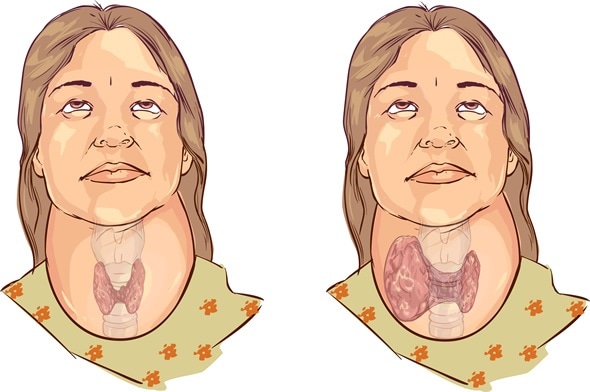Goiter, also sometimes known as goitre, is a health condition that involves the enlargement of the thyroid gland. This causes the formation of a lump in the front of the neck. The lump is usually mobile and moves up and down when the patient swallows.
The thyroid gland is located in the lower area of the neck, in front of the trachea. It is responsible for the production of the thyroid hormones thyroxine (T3) and triiodothyronine (T4).
These hormones are secreted and transported around the body in the bloodstream. They are vital in maintaining many processes in the body such as metabolism of nutrients to yield energy and heat, regulation of the heart rate and of the blood pressure.

Goiter - Image Copyright: corbac40 / Shutterstock
Causes
There are several possible causes of a goiter, such as:
- Underactive thyroid gland (such as in Hashimoto’s disease)
- Overactive thyroid gland ( as in Graves’ disease)
- Hormonal changes (as during puberty or in pregnancy)
- Iodine deficiency, which is the most common cause worldwide
- Thyroiditis
- Intake of goitrogens such as soy, peanuts, cabbage or broccoli
- Pituitary disease
- Radiotherapy
- Nodules or cysts
- Thyroid cancer
- Certain medications
Signs and Symptoms
The size of a goiter can vary considerably. For most individuals with a goiter, the lump is small and may not cause noticeable symptoms.
The thyroid is close to various organs such as the trachea, esophagus, the laryngeal nerves, and the voice box. Thus, in more cases of severe thyroid enlargement, patients may present with symptoms such as:
- Tightness in the throat
- Voice changes such as hoarseness
- Dysphagia
- Difficulty breathing
- Cough
Diagnosis
To diagnose a goiter, the first step involves a physical examination of the neck to check for signs of swelling in the area that are consistent with an enlarged thyroid.
A thyroid function test is then performed to measure the function of the thyroid gland.
This test measures the levels of the hormones in your blood that are usually produced by the thyroid gland, as well as the thyroid stimulating hormone (TSH).
The results may indicate an underactive or overactive thyroid, both of which conditions are capable of causing a goiter.
Depending on the specific case, referral to a specialist for further diagnostic tests and treatment may be required. These tests may include:
- an ultrasound thyroid scan
- a thyroid radioiodine uptake scan
- a radio-scan of the thyroid
- a tissue biopsy
- other blood tests
- imaging scans such as magnetic resonance imaging (MRI) and computed tomography (CT) scans
There are two main types of goiter:
- Diffuse goiter: swelling of the entire thyroid gland
- Nodular goiter: development of nodules or lumps in the thyroid gland
Goiters may also be toxic or nontoxic, depending on whether or not symptoms and signs of overactivity are present.
Treatment
Some individuals with a goiter will be asymptomatic, and treatment is not required immediately.
Instead, the patient can be advised as to what signs to watch for, that may indicate worsening of the condition. This may include signs of compression, as given above.
Other danger signs may include a sudden increase in size, the rapid onset of pain, or a change in the hardness or softness of the gland. In such a case, medical advice should be sought for treatment.
For symptomatic goiters, it is essential to determine the underlying cause of the goiter in order to recommend the most appropriate treatment.
If the thyroid gland is underactive or overproductive, treatment is usually needed to correct the abnormal production of thyroid hormones. This may include:
- thyroid surgery to remove some or all of the thyroid gland
- radioiodine treatment to destroy some of the thyroid tissue
Following these treatment techniques, patients may develop thyroid deficiency, especially if all or most of the thyroid is removed or destroyed.
They will need to take thyroxine tablets in appropriate doses, to replace the hormone that is no longer being produced.
For other causes, such as iodine deficiency, other treatment methods are recommended.
This typically involves increased dietary intake or supplementation of iodine, to help stimulate the normal production of hormones in the thyroid gland.
Surgery is usually preferred for patients with goiters which are:
- Malignant
- Large and unsightly
- Producing compression of nearby structures
- Not responding to medical therapy
References
Further Reading
Last Updated: Feb 26, 2019